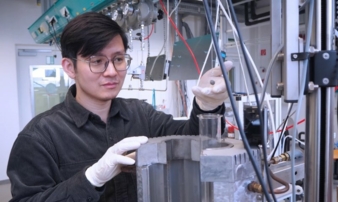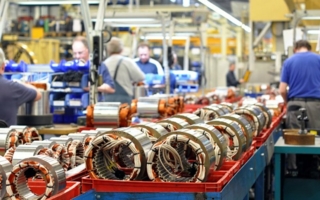01/09/2023
Sustainability and competitiveness for Europe’s metallurgical industry
The European Union is now funding a collaborative research project with 7 million euros that is aiming to develop and demonstrate an integrated sustainable process to produce manganese (Mn) and Mn alloys from Mn ores and Mn-containing waste. The Max-Planck-Institut für Eisenforschung (MPIE) is one of 17 project partners.
How to make the metallurgical industry in Europe more sustainable while maintaining its economic competitiveness? One game changer is to find a green solution to producing manganese, which is of significant importance for the steel, aluminium, battery and automotive industry.
Research results will be tested on industrial scale
About 1.4 million tons of manganese ferroalloys were produced in Europe in 2020, relying on about 70% of imported ores, while leading to about 2.5% of the EU metallurgical industries total CO2 emissions. Moreover, Europe imported about 111,000 tons of electrolytic manganese and 38,000 tons of electrolytic manganese dioxide in 2020. The newly started EU-wide project “Sustainable Hydrogen and Aluminothermic Reduction Process for Manganese, its alloys and Critical Raw Materials Production” (acronym: HalMan) is aiming at cutting imports by valorising existing industrial waste, reducing the carbon footprint of manganese production and maintaining Europe’s competitiveness in the metallurgical industry. The project is coordinated by the Norwegian University of Science and Technology, while every project partner brings in its own expertise.
“The manganese ores and manganese-containing waste will be reduced by hydrogen and secondary aluminium sources to avoid carbon emissions. We at MPIE, will analyse the kinetics of the pre-reduction process with hydrogen, better understand the role of the microstructure and local chemistry in the reduction process, and disentangle the fundamental mechanisms limiting the efficiency of the reduction. We are delighted to closely collaborate with other EU partners and contribute to the development of innovative technologies to make the metallurgical industry more sustainable”, says Dr. Yan Ma, group leader at MPIE and one of the project partners. After defining the ideal process route, the MPIE team is also aiming at producing two advanced high and medium-manganese steels using the manganese produced in the reduction process and compare their mechanical properties with commercially available steels. High Mn steels are especially interesting for low temperature applications such as the storage and transport of natural gas and hydrogen. Medium Mn steels are crucial for lightweight design for example in the automotive industry. The developed process route will be tested in an industrially relevant, operational environment to guarantee a high technological readiness level.
About the project
The HAlMan project is Co-funded by the European Union. The project’s consortium is composed of 14 partners and 3 associated partners (AP), representing 10 countries. The project coordinator is Norwegian University of Science and Technology (Norway). Consortium partners are OFZ AS (Slovakia), Mintek (South Africa), SINTEF AS (Norway), WIT Berry (Latvia), National Technical University of Athens (Greece), Max-Planck-Institut für Eisenforschung GmbH (Germany), Advanced Minerals and Recycling Industrial Solutions (Greece), Ethniko Kentro Erevnas Kai Technologikis Anaptyxis (Greece), Mytilineos Anonimi Etaireia (Greece), CALIX Europe (France), CALIX LTD (Australia, AP), Spolka Akcyjna Odlewnie Polskie (Poland), Imperial College of Sceince and Technology and Medicine (United Kingdom, AP), MET4 (Greece), Transalloy PTY LTD (South Africa), Assmang (South Africa, AP). Project has started in January, 2023 and its duration is 4 years. Grant agreement ID: 101091936.
The international team of the Max-Planck-Institut für Eisenforschung conducts advanced basic materials research for the fields of mobility, energy, infrastructure, medicine and digitalisation. The focus lies on nanostructured metallic materials as well as semiconductors, which are analysed down to their atomic and electronic scales. This enables the MPIE team to develop new, tailor-made structural and functional materials embracing their synthesis and processing, characterization and properties, as well as their response in engineering components exposed to real operating environments.
Max-Planck-Institut für Eisenforschung GmbH (MPIE)
Max-Planck-Strasse 1, 40237 Düsseldorf, Germany
Contact person is Yasmin Ahmed Salem
Tel.: +49 211 6792-722
y.ahmedsalem@mpie.de


